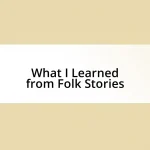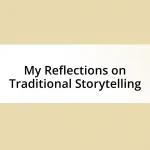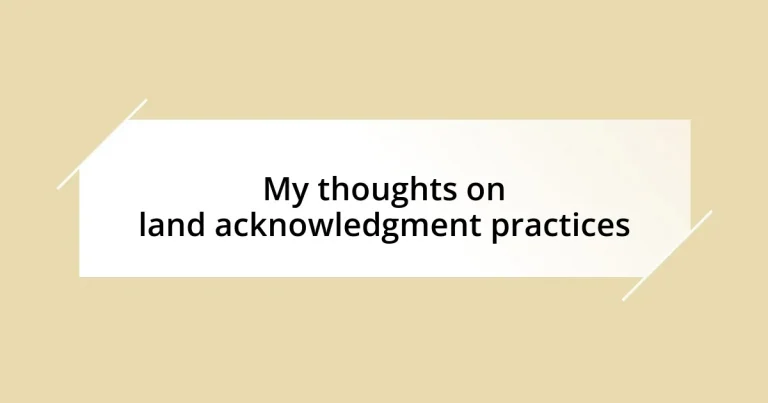Key takeaways:
- Land acknowledgment practices are essential for recognizing Indigenous peoples’ histories and fostering respectful relationships with them.
- These practices should inspire actionable steps towards advocacy for Indigenous rights and sustainability beyond mere formality.
- Engagement with Indigenous communities involves building genuine relationships, attending events, and collaborating on projects that honor their knowledge and culture.
- Personal responsibility in the context of land acknowledgment includes integrating awareness into daily life and fostering ongoing dialogues about Indigenous histories and rights.
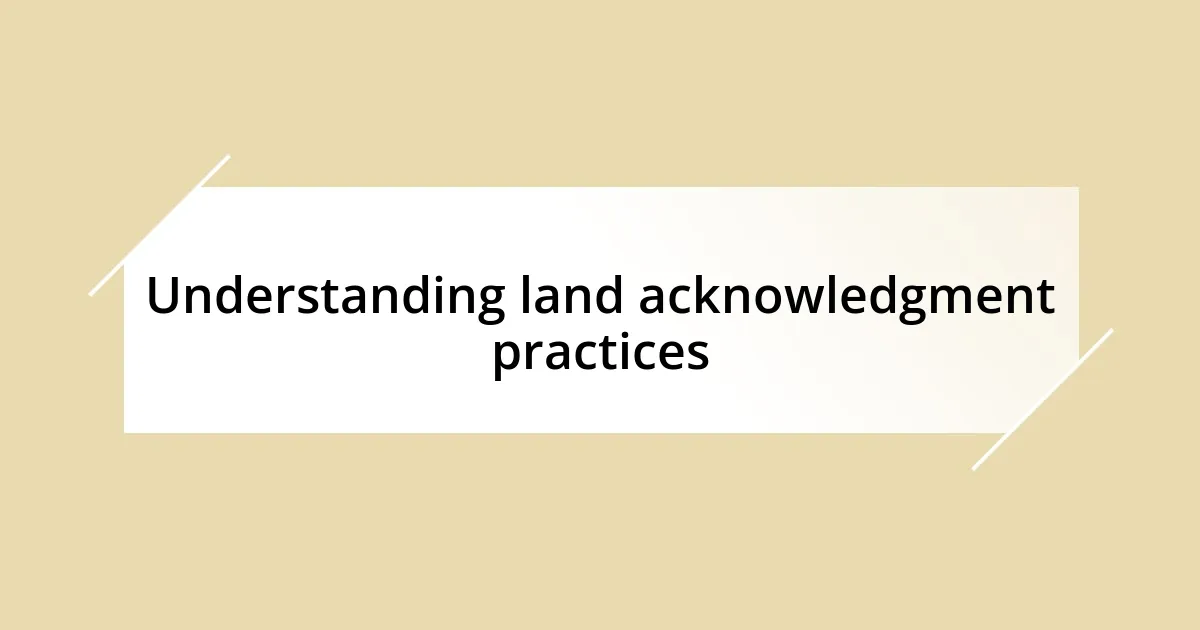
Understanding land acknowledgment practices
Land acknowledgment practices represent a vital act of recognizing and honoring the Indigenous peoples whose ancestral territories we occupy. I remember attending an event where, before any discussion began, the organizers took a moment to acknowledge the land we were on. It struck me then how such a brief statement can carry profound meaning and serve as a reminder of the ongoing relationship that exists between the land, its original inhabitants, and us.
These practices go beyond mere words; they challenge us to reflect on our relationship with the land and encourage a deeper understanding of history. Have you ever thought about the stories that the ground beneath your feet could tell? For me, it was a revelation to realize that acknowledging the land is not just a formality, but a way to begin conversations about justice, respect, and connection with Indigenous communities.
As we engage in land acknowledgments, it’s essential to consider their implications for our actions moving forward. In my experience, these acknowledgments can be a catalyst for change, prompting individuals and organizations to take meaningful steps toward reconciliation. How can acknowledging the land inspire us to support Indigenous rights and sustainability? I believe it all starts with awareness and a commitment to listening and learning from Indigenous voices.
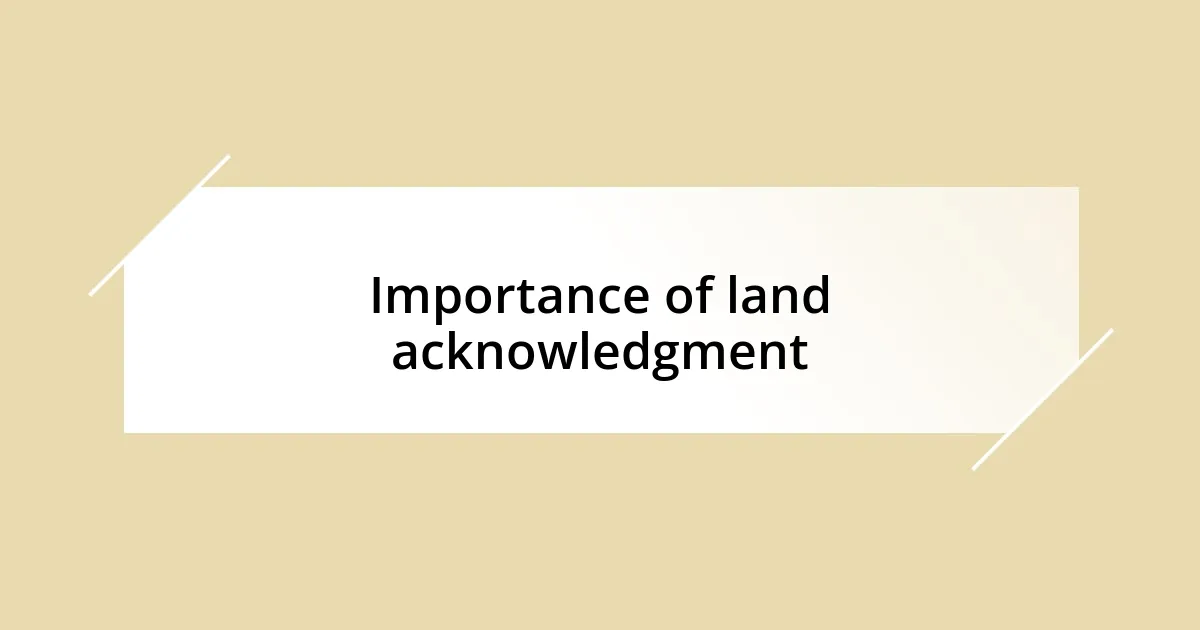
Importance of land acknowledgment
Land acknowledgment is much more than a statement; it’s a way to foster respectful relationships with Indigenous communities. I recall a gathering where someone shared their family’s history tied to the land, painting a vivid picture for all of us present. These moments highlight how acknowledging the land strengthens our understanding of cultural heritage and shared histories, bridging gaps in communication.
Moreover, land acknowledgment emphasizes the importance of recognizing historical injustices faced by Indigenous peoples. It’s a reminder of the resilience and survival of their cultures. At a community meeting I attended, the discussion expanded into how we all carry forward the responsibility to educate ourselves and others. This shift in perspective can motivate us to act, promoting advocacy for Indigenous rights and sovereignty in our daily lives.
When we practice land acknowledgment, we create spaces that honor diverse narratives and experiences. It’s essential to remember this isn’t just about recognition; it’s a call to action. I remember feeling empowered after participating in an event where the land was acknowledged. It sparked conversations about what tangible actions we could take to support local Indigenous communities. Recognizing the land is a foundational step toward building a more inclusive future.
| Aspect | Explanation |
|---|---|
| Recognition | Validates Indigenous histories and cultures |
| Awareness | Encourages reflection on our relationship with the land |
| Responsibility | Inspires actionable steps towards justice and advocacy |
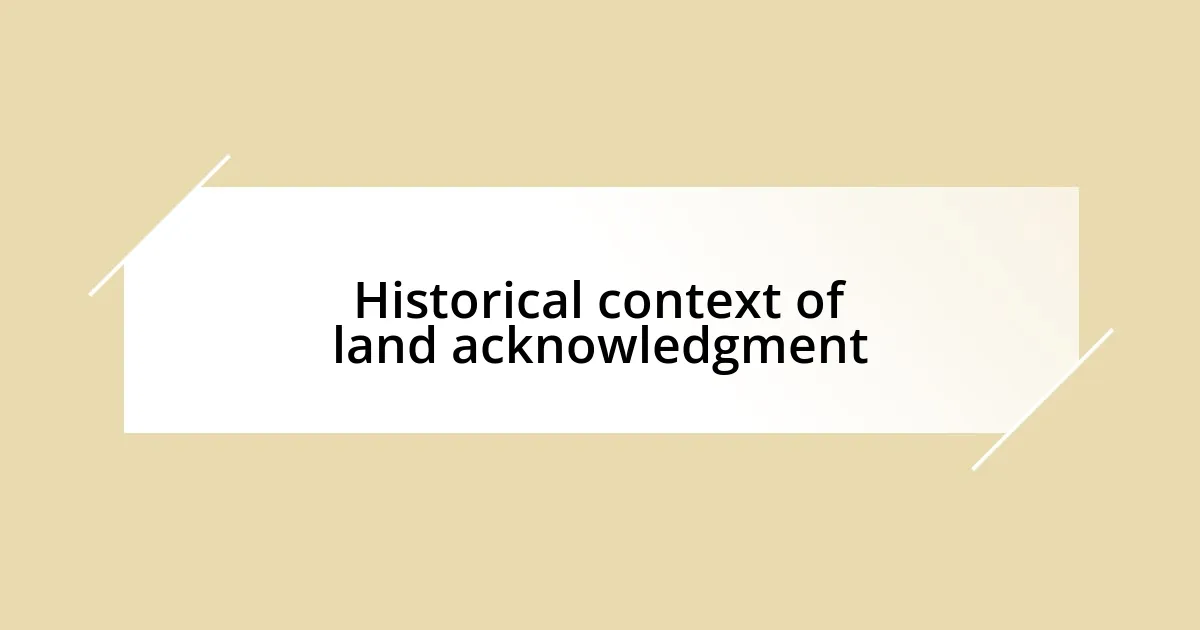
Historical context of land acknowledgment
Land acknowledgment practices have deep historical roots, often tracing back to the relationships established—albeit unevenly—between settler societies and Indigenous peoples. I still remember the first time I learned about treaties and agreements that had long been forgotten or overlooked in our education system. It was eye-opening. The reality is that many land acknowledgment statements emerge from a history of colonization, where traditional land practices were disrupted and ignored.
Consider these key historical aspects of land acknowledgment:
- Colonial Impact: The forced displacement of Indigenous peoples from their territories disrupted their way of life and connection to the land.
- Reclamation of Narratives: Land acknowledgment helps reclaim voices that were silenced in mainstream history, allowing for dialogue about the past.
- Cultural Heritage: Recognizing land is an expression of respect for the cultures and languages that have thrived for millennia.
When I think about the first land acknowledgment I heard at a community event, it felt like a bridge to the past. The speaker paused, gathered their thoughts, and articulated the names of the tribes who once inhabited that land. It wasn’t just an introduction; it became a moment of connection that resonated deeply with me. It reminded us that, while we are here today, we are standing on the stories and sacrifices of those who came before us. The simplicity of those words ignited a flicker of responsibility in me—a feeling that I needed to learn more about those histories and engage with the communities still here.
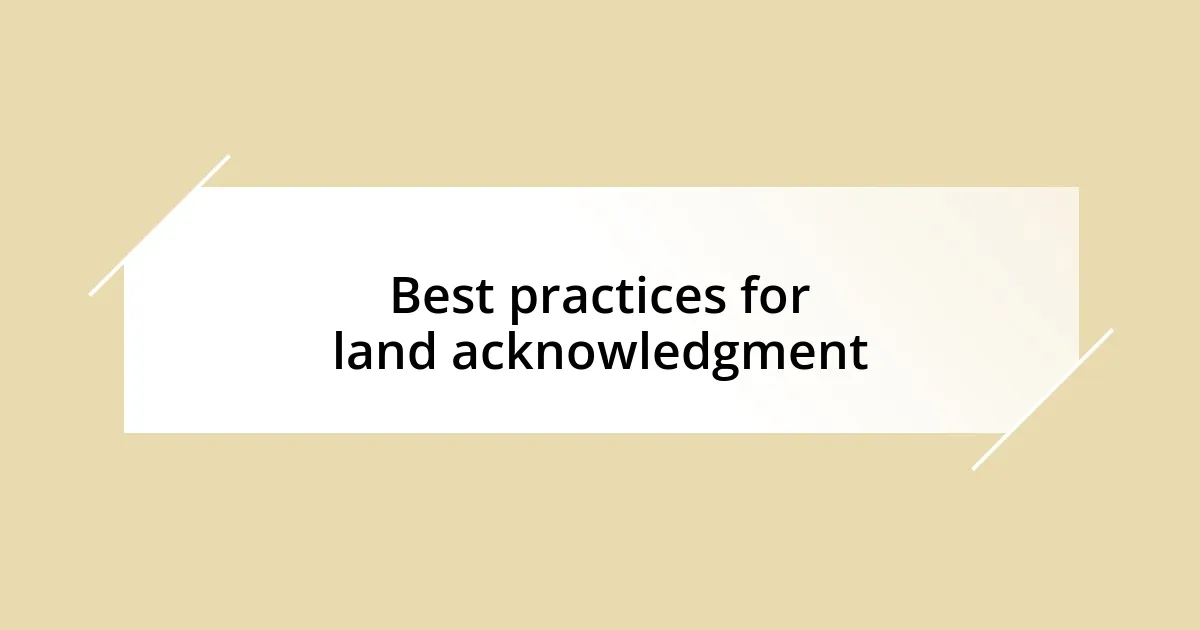
Best practices for land acknowledgment
Best practices for land acknowledgment center around authenticity and intentionality. When crafting a land acknowledgment, it’s crucial to ground your statement in genuine respect for Indigenous peoples and their histories. I remember attending a workshop where a facilitator emphasized the importance of understanding the specific tribes associated with the land. This personalized approach not only fosters connection, but it also invites deeper education about the culture, language, and ongoing struggles of those communities.
In my experience, it’s beneficial to include the voices of Indigenous community members in the acknowledgment process. I once collaborated on a project where we invited local elders to share their perspectives, making our statement richer and more meaningful. Including their input not only honors their wisdom but also creates a collaborative spirit. It raises an important question: Are we truly listening to the narratives of those whose land we occupy? When we genuinely engage with Indigenous voices, we transform a passive acknowledgment into an active commitment.
Finally, it’s vital to accompany land acknowledgment with actionable steps. A simple statement can feel empty without a plan to support Indigenous rights or engage in community advocacy. Reflecting on a local event where the acknowledgment was paired with initiatives for Indigenous education, I felt a surge of hope. It demonstrated that acknowledgment is not merely a formality—it can spur us to advocate for policy changes, support Indigenous-led projects, and promote cultural appreciation. How can we take that energy and turn it into tangible actions for justice? Recognizing land challenges us to evolve beyond acknowledgment into a journey of allyship and mutual respect.
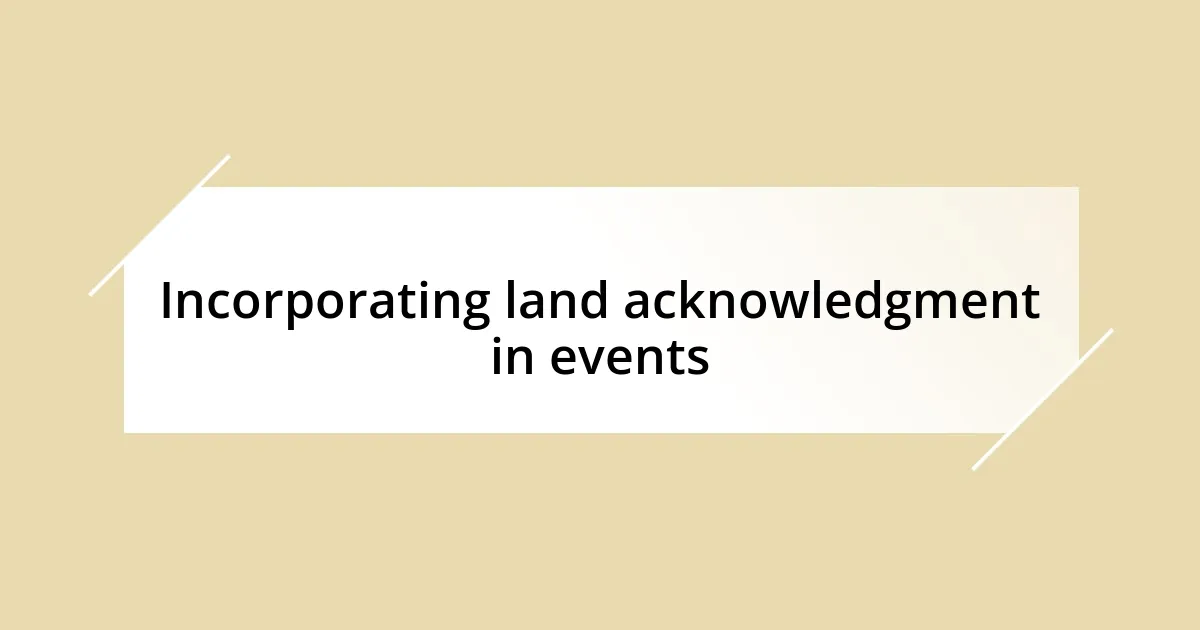
Incorporating land acknowledgment in events
Incorporating land acknowledgment into events requires thoughtful delivery and context. I recall attending a conference where the land acknowledgment was woven seamlessly into the opening remarks. The speaker took a moment to explain the significance of the land, drawing connections between the local Indigenous history and the event’s purpose. This approach felt genuine and set a tone of respect, reminding us all of our shared responsibility.
It’s essential to consider the audience’s composition when crafting your acknowledgment. I once facilitated a workshop with diverse participants, and we collectively explored the local Indigenous history before presenting our acknowledgment. This collective learning made the statement feel more impactful because everyone had a shared understanding of why it mattered. It raised a question that lingered with us: How can we, as individuals, carry this awareness beyond just one event?
Action should follow acknowledgment. During a recent community festival, the organizers highlighted Indigenous musicians and artists, making the acknowledgment not just a statement but a celebration of culture. Observing how the energy shifted in the crowd, I felt a deep appreciation for recognizing the living cultures that still thrive today. Isn’t it empowering to think that our recognition can foster connections and collaborations that uplift Indigenous voices? By aligning our acknowledgments with meaningful actions, we pave the way for true respect and partnership.
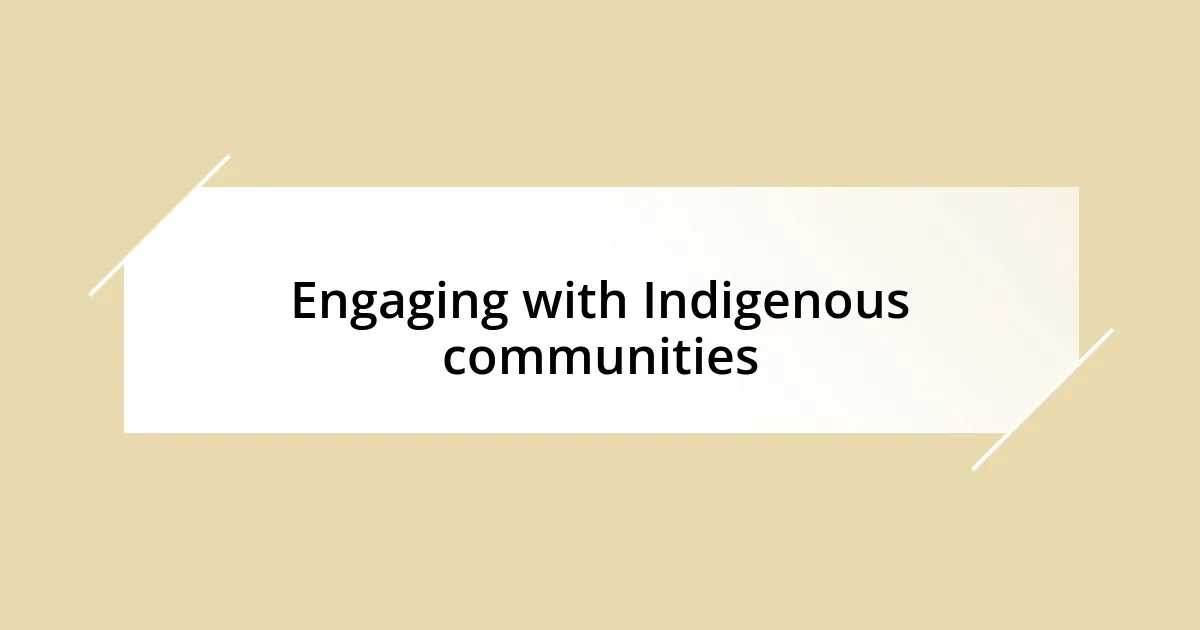
Engaging with Indigenous communities
Engaging with Indigenous communities is a dynamic process that goes beyond mere acknowledgment; it calls for building genuine relationships. I remember my first experience attending a local Indigenous community event—I was struck by the warmth and openness of the participants. It showed me that meaningful engagement begins with humility and a willingness to learn directly from those who hold deep connections to the land. How often do we take the time to listen and fully understand the stories that shape a community?
I’ve also found that attending workshops led by Indigenous leaders can be incredibly enlightening. In one session, the facilitator, a respected elder, shared stories that wove together personal experiences and historical events. These narratives were not just educational; they ignited a desire in me to delve deeper into the social and political realities faced by Indigenous peoples today. It made me reflect: When was the last time I intentionally sought out the experiences of those different from me? This active engagement fosters respect and learning that transforms one’s perspective.
Moreover, collaborating on community projects offers unique opportunities to support Indigenous voices. I once worked alongside a group that sought to revitalize traditional crafts, allowing Indigenous artisans to lead workshops. It was inspiring to witness the exchange of knowledge, and the joy in participants’ eyes was undeniable. In those moments, I couldn’t help but ask: How can we create more spaces where Indigenous knowledge is valued and shared? Engaging with communities in this way is not only a gesture of recognition; it’s a pathway toward healing and reconciliation, reminding us that these relationships must be nurtured with care and intention.
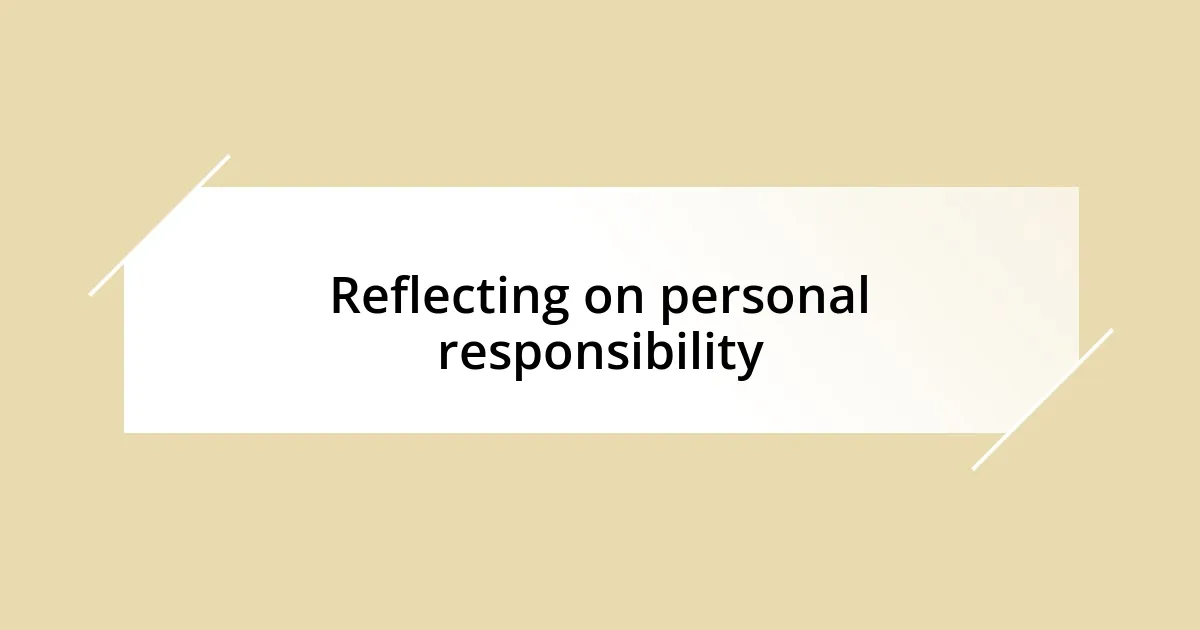
Reflecting on personal responsibility
I often find myself reflecting on personal responsibility in the context of land acknowledgment. When I first encountered the practice, it struck me that merely saying the words wasn’t enough; I felt a profound obligation to understand their significance. It prompted me to ask myself, “What am I truly doing to honor this acknowledgment in my everyday life?” This led me on a journey of exploration—realizing that my role extends far beyond a single statement at an event.
Living in a community enriched by Indigenous histories, I became more aware of how my actions, or inactions, reflect my understanding of that heritage. I recall volunteering at a local preservation project, where we focused on recognizing and restoring Indigenous plants. Each day, as I dug my hands into the soil, I felt a sense of personal connection grow within me. I asked myself, “How can I contribute to the healing of this land and its stories?” This connection deepened my commitment to advocate for policies that acknowledge and respect Indigenous rights, reminding me that each small action counts.
It’s crucial to think about how we can carry that responsibility into our daily lives. Integrating awareness into casual conversations has become part of my practice. I often find myself sharing insights with friends about local Indigenous history when discussing our area. It leads to deeper discussions, fostering an environment where learning is continuous. I can’t help but think, “How can we challenge ourselves and others to take these conversations even further?” Ultimately, these reflections strengthen my belief that acknowledging the land is just the beginning; true responsibility lies in fostering an ongoing dialogue that enriches our understanding and relationships.


